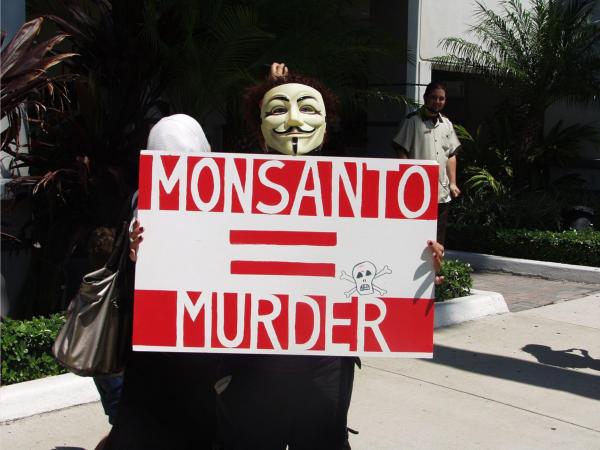During a recent trip to Home Depot, I found myself standing next to another customer in the lawn and garden department. He was attentively looking over a container of the weed killer Roundup. "Isn't this the one that causes cancer?" he asked. "No, the lawyers made that up," I replied. He smirked and put the herbicide in his cart. "OK, thanks," he said as he walked away.
I didn't think much of this interaction until I saw an April blog post from reporter turned anti-pesticide activist Carey Gillam titled "Just when you think your work matters a survey comes along to set you straight." Gillam has spent a significant chunk of her career trying to stoke the public's fear of glyphosate, the active ingredient in Roundup. After years of collaborating with Scientology-linked law firms and attorneys now serving prison time for attempted extortion, Gillam recently looked back on her work and lamented the insignificant impact she's had on public opinion.
A recent survey conducted by One Degree Organic Foods shows “that virtually no one knows about” the herbicide, she wrote:
“... [D]espite the fact that glyphosate is the most widely used weed killer on the planet, despite the fact that it is the subject of litigation brought by more than 100,000 people in the United States, and despite the fact that scientists around the world have been warning for decades that glyphosate exposure could cause cancer or other health problems, 81% of North Americans said they were not familiar with glyphosate.”

Gillam no doubt intended her post to be a wake-up call of sorts to whomever might read it. But I think her navel-gazing helpfully reveals why the activist assault on glyphosate has utterly failed to rouse nationwide opposition to biotech crops and the pesticides often paired with them. The reason, stated briefly, is that a campaign built on dubious science is bound to fail in the long run.
Everything but the kitchen sink
Over the last decade, the organic food industry and its hired guns at the Environmental Working Group, U.S. Right to Know (Gillam's former employer) and other environmentalist outfits have fired everything in their arsenal at glyphosate: “studies” that detected the herbicide in breakfast cereal, book-length “investigations” of Monsanto's alleged wrongdoing, and even a backroom collaboration with the International Agency for Research on Cancer that facilitated all the litigation Gillam referred to.
Those 100,000-plus lawsuits will probably cost Bayer several billion dollars to settle and they illustrate how effective junk science can be in a courtroom, but this legal strategy has its limits. The company won back-to-back cases late last year against plaintiffs who alleged that Roundup caused their non-Hodgkin's Lymphoma (NHL). Bayer is also pulling glyphosate out of its lawn and garden products, significantly reducing the risk of future litigation. [1] It's also possible that the US Supreme Court will end all current and future glyphosate-litigation against the company.
The disaster never came
The ultimate problem for Gillam and her compatriots is that glyphosate never caused a surge in NHL cases; rates of the disease have remained stable while use of the weed killer has exploded. Even among farmers and pesticide applicators, who have the highest exposure to Roundup of anyone, there is no evidence of elevated cancer risk. As a result, most consumers probably don't know about glyphosate because the harm it is suppose to cause is entirely fictional.
Gillam is aware of all this information (because it's been explained to her), yet she insisted that there is “a growing stack of scientific research” backing up her allegations. She pointed to this April 22 paper that uncovered an association between glyphosate concentrations in urine and DNA methylation, which regulates gene trascription and may contribute to the development of cancer in certain circumstances. A few important limitations stand out if you read the study:
- “...[T]he mechanisms by which glyphosate and AMPA could impact human health remain unclear.” If glyphosate or AMPA (the degradation product produced when glyphosate is metabolized), do impact human health, the researchers don't know how it happens. This is likely because there is no effect; research has shown that consumers aren't exposed to sufficient amounts of the weed killer to experience any harm. That leads us to a related limitation in the paper.
- “The power of these analyses may be limited by the relatively low exposure levels in this population.”
- The study authors were unable to “infer the temporal relationship between DNA methylation differences and glyphosate exposure, given the cross-sectional nature of the study.” Which came first, the DNA methylation or the glyphosate exposure? They don't know.
- “... [A]lthough we did not observe a relationship between recent herbicide use and glyphosate and AMPA concentrations, those data were missing for 37% of participants, which should be considered another limitation of the study.” That's a signigicant gap in the data. Moreover, the numbers they actually collected were self-reported by the study participants, yet another red flag because people often don't accurately monitor their exposures in epidemiological studies.
Putting everything together, Gillam acknowledged that most people aren't concerned about glyphosate. She claimed there was abundant evidence that should worry them, then she cited a preliminary study investigating acute glyphosate exposure that has several serious limitations. If the weed killer causes cancer (and that's a very unlikely “if” after four decades of research), you need more than two days worth of urine data to document its impact.
Add Gillam's lamentation to the growing list of reasons the anti-GMO campagin is fading into obscurity.
[1] Glyphosate is off patent, so other manufactures will continue to sell glyphosate-based herbicides to the general public, yet another indication that the litigation wasn't about preventing NHL.




